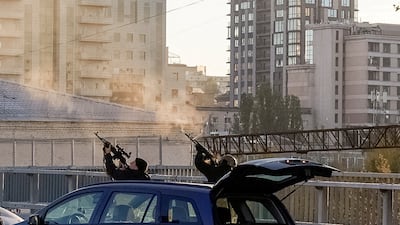Moscow has reached an agreement with Tehran to begin manufacturing hundreds of unmanned weaponised aircraft on Russian soil, The Washington Post reported, citing intelligence seen by US and other western security agencies.
The Washington Post said Russian and Iranian officials finalised the deal during a meeting in Iran in early November.
Russia and Iran are moving rapidly to transfer designs and key components that could allow production to begin within months, three officials familiar with the matter said, according to the US newspaper.
Building the drones on Russian soil instead of relying on Iranian exports would signal a new step in Iran-Russian military ties and allow Moscow to increase its stockpile of relatively cheap weapons.
Moscow has reached an agreement with Tehran to begin manufacturing hundreds of unmanned weaponised aircraft on Russian soil, The Washington Post reported, citing intelligence seen by US and other western security agencies.
The Washington Post said Russian and Iranian officials finalised the deal during a meeting in Iran in early November.
Russia and Iran are moving rapidly to transfer designs and key components that could allow production to begin within months, three officials familiar with the matter said, according to the US newspaper.
Building the drones on Russian soil instead of relying on Iranian exports would signal a new step in Iran-Russian military ties and allow Moscow to increase its stockpile of relatively cheap weapons.
In recent months, Russia has started using Iran-made kamikaze drones to allegedly target civilian infrastructure, a move that triggered EU sanctions last month.
Intelligence officials told The Washington Post that Russia had used more than 400 Iranian-made attack drones against Ukraine since August.
Ukrainian President Volodymyr Zelenskyy previously described the transfer of drones to Russia as "bloody money".
The prices of Iran's Shahed-136 drones can range between €20,000 and €50,000 ($19,604 and $49,011), which is considerably cheaper than some of the more sophisticated weapons from Russia's own arsenals. In contrast, modern cruise missiles and hypersonic ballistic missiles can cost millions of euros.
The drones fly slowly enough to be shot out of the sky with a well-aimed rifle, but because of their low cost, they can be sent in swarms.
Iran's Foreign Minister Hossein Amirabdollahian said earlier this month that Tehran had given the drones to Moscow before it invaded Ukraine in February.
Russia's defence ministry did not respond to a request for comment.
Nato officials believe that Iran may also be sending ballistic missiles to Russia for use in Ukraine.
EU officials have said that Brussels is working on independently verifying reports of ballistic missile transfers. Should they be confirmed, they would probably trigger a new round of sanctions against Iran.
In recent months, Russia has started using Iran-made kamikaze drones to allegedly target civilian infrastructure, a move that triggered EU sanctions last month.
Intelligence officials told The Washington Post that Russia had used more than 400 Iranian-made attack drones against Ukraine since August.
Ukrainian President Volodymyr Zelenskyy previously described the transfer of drones to Russia as "bloody money".
The prices of Iran's Shahed-136 drones can range between €20,000 and €50,000 ($19,604 and $49,011), which is considerably cheaper than some of the more sophisticated weapons from Russia's own arsenals. In contrast, modern cruise missiles and hypersonic ballistic missiles can cost millions of euros.
The drones fly slowly enough to be shot out of the sky with a well-aimed rifle, but because of their low cost, they can be sent in swarms.

Iran's Foreign Minister Hossein Amirabdollahian said earlier this month that Tehran had given the drones to Moscow before it invaded Ukraine in February.
Russia's defence ministry did not respond to a request for comment.
Nato officials believe that Iran may also be sending ballistic missiles to Russia for use in Ukraine.
EU officials have said that Brussels is working on independently verifying reports of ballistic missile transfers. Should they be confirmed, they would probably trigger a new round of sanctions against Iran.

